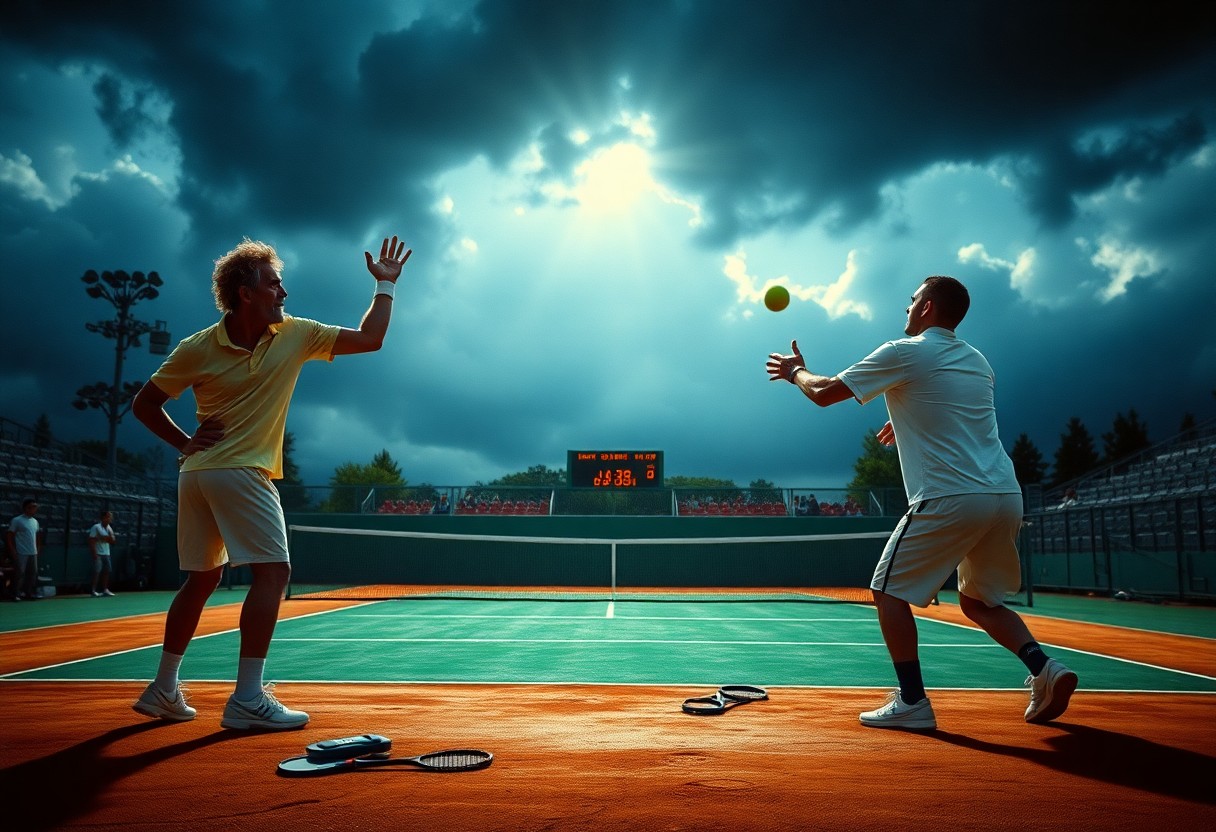Most players underestimate the mental aspect of tennis, yet it plays a vital role in performance. Mastery over your focus and confidence can significantly influence match outcomes. This guide explores effective strategies to improve your mental game, helping you maintain clarity under pressure and turning potential anxiety into motivated energy. By honing your mental skills, you can enhance your game and cultivate a winning mindset.
Types of Mental Challenges in Tennis
Tennis players face various mental challenges that can impact their performance. These include pre-match anxiety, in-match distractions, fear of failure, pressure to perform, and self-doubt. Each of these challenges must be navigated effectively to maintain focus and confidence. Thou can overcome these obstacles with the right mindset and strategies.
| Type of Challenge | Description |
| Pre-Match Anxiety | Nervousness before a match. |
| In-Match Distractions | Loss of concentration during play. |
| Fear of Failure | Worry about underperforming. |
| Pressure to Perform | Expectations from self and others. |
| Self-Doubt | Lack of confidence in abilities. |
Pre-Match Anxiety
Pre-match anxiety often manifests as a mix of excitement and nervousness. This mental state can lead to symptoms like a racing heart or shaky hands. To counter anxiety, players may develop pre-match routines or use breathing techniques to calm their nerves. These approaches help foster a mindset conducive to success.
In-Match Distractions
In-match distractions can severely impact performance, drawing focus away from the game. External factors, such as spectators or environmental conditions, and internal factors like wandering thoughts can all contribute to a loss of concentration. By honing focus and employing techniques such as mindfulness, players can regain their composure, keeping their mental game sharp throughout the match.
To tackle in-match distractions, players often implement strategies like visualization, where they picture successful shots or scenarios to maintain concentration. Additionally, some use tactical pauses between points to reset their mindset. Keeping a clear mental focus while adopting a neutral response to distractions ensures that players can perform consistently, no matter the external circumstances. Regular practice of these techniques can lead to a significant reduction in match-time distractions, allowing players to stay locked in on the game.
Tips for Staying Focused
Staying focused during a tennis match requires a blend of mental fortitude and strategic planning. Here are some effective tips:
- Set clear goals for each match.
- Limit distractions both on and off the court.
- Visualize success before matches.
- Practice deep breathing to manage anxiety.
After implementing these strategies, players can enhance their ability to concentrate and perform under pressure.
Developing a Pre-Match Routine
A well-structured pre-match routine is necessary for mental preparation. This could include specific warm-up exercises, listening to music that energizes you, or visualizing your best performance. Establishing a routine helps create a sense of normalcy and reduces anxiety, allowing players to approach matches with confidence and clarity.
Mindfulness Techniques
Incorporating mindfulness techniques into training enhances focus and performance. Engaging in mindfulness can involve practices like meditation, which trains the mind to stay present and reduces anxiety. Techniques such as focusing on your breath during intense moments on-court can help bring attention back to the game. This practice lowers emotional reactions and maintains a strong competitive mindset.
Mindfulness techniques, when consistently practiced, improve one’s ability to handle pressure. For example, a study published in the Journal of Sport Psychology found that athletes who engaged in mindfulness meditation experienced significant reductions in stress and increased performance levels. Implementing simple strategies such as guided imagery or conscious breathing can foster greater awareness, enabling players to navigate the highs and lows of a match more effectively. Prioritizing these methods can make a notable difference in maintaining composure and confidence during competition.
Step-by-Step Guide to Boosting Confidence
| Setting Achievable Goals |
Establishing clear, measurable goals can significantly enhance a player’s confidence. Begin by breaking down long-term objectives into smaller, realistic steps. For instance, instead of aiming to win a tournament outright, focus on improving specific skills, like your serve or backhand consistency, over a defined period. |
| Visualization Strategies |
Utilizing visualization techniques can help players picture success vividly. Spend a few minutes daily imagining winning points, executing perfect shots, and celebrating victories, enhancing self-belief and focus during actual matches. |
Setting Achievable Goals
Defining tangible, achievable goals for your tennis performance aids in building confidence. Whether aiming to improve your serve speed or increase your match win percentage, create specific targets. Track your progress regularly to acknowledge improvements and adjust goals as necessary, fostering a greater sense of accomplishment.
Visualization Strategies
Employing visualization strategies can become a game-changer in mental preparation. Picture every aspect of your performance – from the warm-up to executing critical points in a match. Studies show that athletes who practice visualization can enhance their psychological readiness and boost performance. This technique not only cultivates positive mental imagery but also prepares the mind for real-time match situations. Consistent practice can help transform anxiety into confidence during competitions.
Factors Influencing Mental Performance
Multiple elements can shape a player’s mental performance in tennis. From the environment around them to their own personal mindset, these factors can either bolster confidence or create self-doubt. Control over these influences can drastically improve a player’s focus and resilience during matches. Any variations in these factors can lead to a fluctuating mental state.
- composure
- self-belief
- pressure management
Environmental Factors
The environment significantly affects players’ concentration and mental resilience. Factors such as crowd noise, weather conditions, and even the playing surface can either enhance or hinder performance. Adjusting to a loud crowd or humid weather can pose challenges. Thou should analyze these elements before matches to develop effective coping strategies.
- crowd influence
- weather conditions
- playing surface
Personal Mindset
A player’s personal mindset is a decisive factor in their mental performance. Believing in one’s abilities while maintaining a positive outlook can significantly enhance resilience during matches. Techniques like visualization and positive affirmations help athletes cultivate a growth mindset. Research shows that players who maintain an optimistic attitude can recover from setbacks more effectively. Developing a strong mental toolkit is necessary to navigate challenges in competitive environments.
Pros and Cons of Various Mental Techniques
| Technique | Pros | Cons |
|---|---|---|
| Positive Affirmations | Boosts self-esteem, encourages a positive mindset. | May feel insincere if not genuinely believed. |
| Visualization | Enhances focus, prepares for various match scenarios. | Can be time-consuming, requires strong imagination. |
| Mindfulness Meditation | Improves concentration and reduces anxiety. | May take time to develop proficiency. |
| Routine Development | Builds consistency and reduces pressure. | Can become rigid and counterproductive if overdone. |
| Journaling | Encourages self-reflection and growth. | Requires discipline to maintain regularly. |
| Positive Self-Talk | Can enhance resilience during tough matches. | Negative thoughts can overshadow affirmations. |
| Affiliation with Supportive Coaches | Provides guidance and encouragement. | Reliance on others may reduce self-reliance. |
| Pre-Match Rituals | Adds structure and focus before a game. | Ritual dependency may lead to performance anxiety. |
| Goal Setting | Drives motivation and accountability. | Unrealistic goals can lead to disappointment. |
| Peer Feedback | Offers various perspectives for improvement. | May lead to conflicting advice and confusion. |
Positive Affirmations
Utilizing positive affirmations can be a powerful tool for athletes, offering boosts in confidence and helping to solidify a player’s self-belief. By repeating affirmations like, “I am strong and focused,” players reinforce a mindset that is conducive to success. Integrating these phrases before matches often leads to elevated performance levels, as mental barriers begin to diminish.
Defensive vs. Offensive Mentality
The choice between a defensive and offensive mentality can significantly impact a player’s approach to the game. Defensive players often focus on minimizing errors and capitalizing on opponents’ mistakes, while offensive players adopt a more aggressive strategy, seeking to dominate points. The balance between these mentalities can adapt depending on the match situation, influencing not only individual player performance but also the overall match dynamics.
A defensive mentality can foster patience and resilience, ideal for navigating tough matchups, while offensive players might rely on instincts and assertive shot-making to seize opportunities. Emotional intelligence plays a key role, as recognizing when to shift mental gears can lead to advantageous outcomes. Some professional players, like Rafael Nadal, embody a defensive strategy, thriving on wearing down opponents, whereas others, like Roger Federer, exhibit an offensive flair, often aiming for quick conclusions to points. Understanding and adapting these mentalities based on the match environment is imperative to elevating performance.
Common Mental Pitfalls
Mental performance in tennis can be severely impacted by common pitfalls that players must navigate. These psychological barriers, if left unaddressed, can undermine focus, confidence, and overall performance. Recognizing these traps is necessary for developing a resilient mindset that thriving athletes exhibit, allowing them to maintain their edge on the court.
Overthinking
Overthinking often paralyzes a player, leading to indecision and mistakes. When athletes obsess over every shot or strategy, their ability to react instinctively diminishes. This mental clutter distracts from the game flow and can breed self-doubt, making it hard to perform at their best.
Choking Under Pressure
Choking under pressure is a notable phenomenon that affects many players during critical moments in matches. This psychological response often stems from heightened anxiety, leading to a breakdown in concentration and execution. Even elite athletes can collapse under intense scrutiny, which can affect their performance through unnecessary tension and fear of failure.
Research shows that athletes are more likely to choke in high-stakes situations, particularly when they are overly aware of their performance and potential consequences. For instance, a player serving for the match can feel heightened expectations, leading to tight muscles and a lack of fluidity in their strokes. Analyses of major tournaments reveal that many players fail to convert winning positions due to internal pressure. This highlights the importance of mental conditioning and breathing techniques to manage anxiety and maintain focus in critical moments.
To wrap up
Ultimately, mastering the mental aspects of tennis strategy is imperative for maintaining focus and confidence on the court. Players must cultivate a strong mental game through techniques such as visualization, positive self-talk, and strategic goal-setting. By integrating these methods into practice and competition, athletes can enhance their performance and resilience, enabling them to handle pressure effectively. A steadfast mindset not only influences individual matches but also contributes to long-term development in the sport. Emphasizing mental preparation will empower players to reach their fullest potential.
FAQ
Q: How can I improve my focus during a match?
A: To enhance focus during a match, practice mindfulness techniques such as deep breathing, visualization, and routine establishment. Develop rituals between points to center your thoughts and maintain concentration on the current play rather than past mistakes or future outcomes.
Q: What strategies can help build my confidence on the court?
A: Building confidence involves setting achievable goals, focusing on strengths, and maintaining a positive self-talk. Regularly reflecting on past successes and preparing mentally for matches can also reinforce self-assurance and promote a winning mindset.
Q: How do I handle pressure in critical moments of a match?
A: Handling pressure can be managed by developing pre-match routines and visualization exercises that simulate high-stakes scenarios. Practicing stress management techniques such as breathing exercises, and focusing on process-oriented goals rather than outcomes, can help maintain composure when it matters most.




